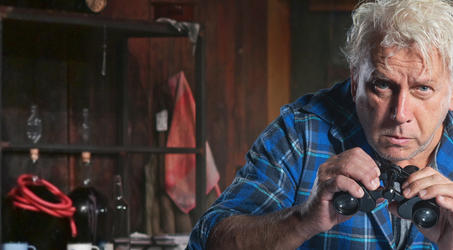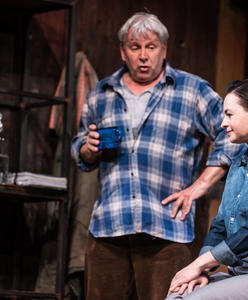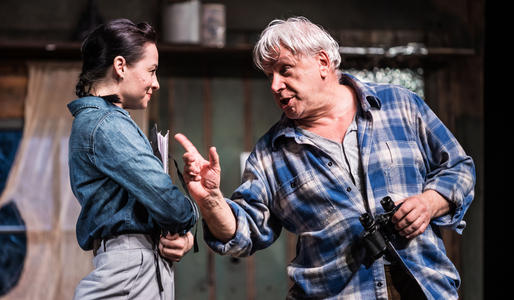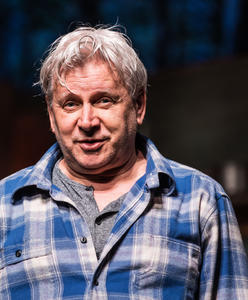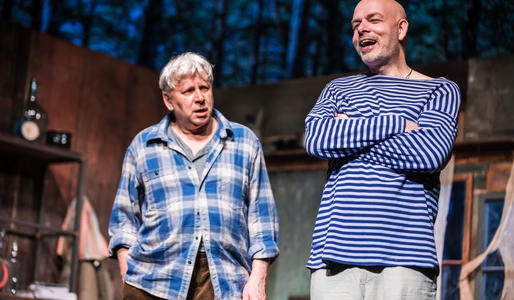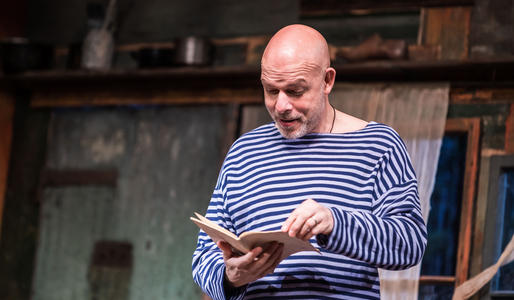The man who watched – the writer and poet Hrabal
Jaroslav Štěpaník 13. November 2021 zdroj www.divadelninoviny.cz/blog
The black comedy Hrabal and the Man at the Window was performed at Brno City Theatre’s Drama Theatre on 6th November 2021. It was another of those premiere performances that were postponed due to anti-epidemic measures. One of the effects of the coronavirus is a unique contemporary phenomenon: a premiere can be preceded by several “repeat performances”. If covid continues trying as it has been up to now, a new tradition could perhaps emerge. It should be said right at the start that the play (which the actors already seemed at home with) was received favourably by the audience, who gave it the appreciation it deserved in the form of spontaneous and sincere applause. The performance was given in the presence of the author, who was visibly moved by the success of the production during the final applause. Bernhard Setzwein (1960), a native of Munich and a winner of the Bavarian Literary Prize (1998), is one of the best-known Bavarian writers. His work spans poetry, fiction and non-fiction, as well as theatre plays. He is very familiar with what´s happening in our country, and has a close relationship with Czech literature. (…) Setzwein´s text is interesting not only in its content but also in its form. With his concept for the play and the specifics of the script, the author shows an understanding of Hrabal and a closeness to him. Setzwein captured Hrabal’s poetic spirit, and breathed a surrealistic and often grotesque atmosphere into the whole story. Zuzana Čtveráčková, the author of the excellent Czech translation, pointed out aptly that both the script and the formal structure resemble a poem. The snitch Dudek´s long, extensive monologues are also a kind of litany, full of uncertainty, misunderstanding, confusion and anxiety about the perceived change: the disappearance of an observed person. This takes away the assurance he’d previously derived from his conscientious, carefully performed service. The director entrusted the demanding part of the central character Dudek to Jan Mazák, who performed it excellently. He coped with the role and its frequent long monologues very successfully, without the slightest hesitation over the text, and with an often rapidly changing emotional accompaniment. The success of the whole play rested on his shoulders. However, the performance of his two acting partners, Radka Coufalová (Lenka) and Viktor Skála (Hrabal), cannot be forgotten. The directorial concept regarding the choice of actors and the portrayal of all three characters was, I think, in perfect harmony with the author´s intention: the whole eighty-minute performance (without a break) held the spectators´ attention and kept them in suspense. The two supporting roles reinforced the dynamics of the play, providing an impulse for Dudek to open up more in his testimony about himself. (…) Everything takes place on a realistically conceived stage by Jaroslav Milfajt, in a cottage (or rather shed) full of junk, an ideal observation post above the place of residence of the observed person. There are also holes from gnarls in the hut boards, which are also ideal for observation. The spectators sometimes get a glimpse of the forest surrounding the cottage area in Kersk, where the writer and his watcher lived. Andrea Kučerová´s costumes, chosen well for the period, completed the atmosphere underlined by Zdenek Merta´s music and David Kachlíř´s lighting.
The successful and very interesting performance was invigorated by the excellent acting performances, especially the impeccable portrayal of the central figure Dudek, the informant who watched the writer Hrabal. Theatre experts and critics who spend their years watching and evaluating actors in distinctly portrayed roles shouldn´t forget to see Jan Mazák in this role. The wait for the Czech premiere was perhaps a bit too long in this case, but Brno City Theatre seized the opportunity first, and with a successful result. The script could attract the attention of dramaturges at theatres specialising in chamber works.
A black comedy for the actor Jan Mazák
Peter Stoličný 10. November 2021 zdroj www.i-divadlo.cz/blogy
There are only a few plays for one actor – so-called one-man shows. The play about Bohumil Hrabal by the German author Bernhard Setzwein almost belongs in this genre. It mainly features Jan Mazák, though it also includes a short performance by Viktor Skála as the confident but already imaginary writer Hrabal, and there is also Lenka, a young woman played excellently by Radka Coufalová. Curious and a little naïve, she piously adores the great writer. It is a specifically, poetically written bitter comedy by a German writer about one of the most important Czech authors of the 20th century. It maps Hrabal´s life and work, as well as the atmosphere of the period, in a natural way. (…) Stanislav Moša, the director of the production, used a translation by Zuzana Čtveráčková, who discovered it for Brno City Theatre. Jan Mazák performed beautiful absurdities in the demanding main role. Spectators may have the feeling at first that the actor is exaggerating a bit with his expressive performance. However, they come to realise that the portrayed cottage-dweller is crazy. This informer just isn´t normal. Those absurd times (in which those of us who are older spent the majority of our lives) caused Dudek to be afflicted with an obsession to watch… and inform. /When I was the dramaturge at the New Stage in Bratislava, I got the impression that almost everyone was informing on each other there. In the end I ran away from that theatre. It was the year 1980./
More than once in this play we witness the eagerness of the informer. It is, in fact, a manic-depressive psychosis without which the affected person cannot live. It becomes part of their personality and brings the fulfilment of their desires. Yes, the informer Dudek is actually a sick person, but he exists in a sick society and so he feels normal. Jan Mazák mastered his character brilliantly. Thanks to this and also Stanislav Moša´s direction and adaptation, a fascinating and emotionally volatile production has taken form.

